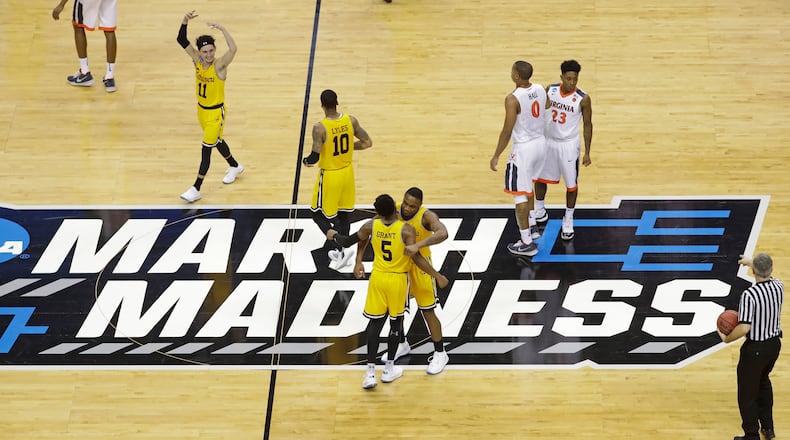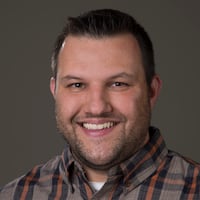“Maybe I’ll get pushback on this, but in my opinion, I think there’s very little difference between somebody who is a 7 seed and the sixth team out of the tournament. Maybe especially this year more than ever. And there’s more parity in our sport. And just with conference realignment and some of those other things, I think that’s inevitable.”
The coach of his opponent Tuesday night, Tony Bennett of Virginia, cracked a joke and smiled at the question, acknowledging his team’s plight this year as one of the last four to receive an at-large bid – one that did not exist prior to the creation of the First Four in 2011.
“I just think there’s something special about the size it’s at,”said Bennett, a basketball lifer whose father, Dick, was a long-time college coach as well. “Maybe there’s room for more, and I’m glad they expanded it to this site. How long has it been since they’ve done that? Good decision. Great decision.”
Bennett has unique perspective in more ways than one. Having coached the first No. 1 seed to lose to a No. 16 when Maryland-Baltimore County knocked out his Cavaliers in 2018, he can attest to the parity in college basketball.
He also remembered being a member of a smaller conference squad that saw its bubble burst in 1992. He was a player at Green Bay (then known as Wisconsin-Green Bay) when the Phoenix won the Mid-Continent Conference regular season title but failed to secure the league’s automatic bid and were relegated to the NIT with a 25-5 record.
“I’ll never forget. We had probably a couple hundred people, the newspaper was there,” he said. “We celebrated, sat there, watched the brackets come out, boom, when we weren’t in, I know that feeling.
“As far as the tournament, the number it’s at now, I think it’s a good number. I don’t think it should go a lot bigger, but if there’s room to expand it and it makes sense timing-wise and maybe some of these teams that are on the bubble — whatever line you move it to, there’s always going to be a bubble, right?”
So-called “bracket creep” has been a concern since not long after the tournament went to 64 teams in 1985, but teams have only been added twice, first to 65 with the original “play-in game” in 2001 then another three squads in 2011.
Yahoo Sports described expansion as “inevitable” in a story published Feb. 13, quoting Big 12 commissioner Brett Yormark and ACC commissioner Jim Phillips suggesting some changes could be appropriate, but many ways exist to accomplish that.
Adding a round and going to 128 would be drastic, and going to 96 would alter the symmetry of the current bracket, so adding another “First Four” (or more) could end up being the route college leaders choose if expansion gains favor.
The bigger question than number of teams might be which teams are in the tournament.
SEC commissioner Greg Sankey told The Athletic this week, “Some of those 11 seeds have proven that they go a long way in the tournament, so we do have, I think, a healthy need for review.”
He did not rule out changing access for smaller conference teams that currently get automatic bids, a core tenet of the modern tournament generally considered to be a crucial aspect in the popularity of an event that appeals far beyond the average sports fan into American pop culture.
“If you take that away, you’re not going to have 12-5 upsets, 16-1 upsets, UMBC, George Mason in the Final Four or the two teams in the Final Four last year,” said Kenneth Blakeney, whose No. 16-seeded Howard is in Dayton representing the MEAC as its tournament champion.
“That is the beauty and the magic of what makes March Madness March Madness. There’s so many brackets that get tossed out the window, and that may be the issue. But it’s what makes March special. And that’s what I talked to our team about is March is different. There’s a magic that goes on if you play with a spirit, if you can stay connected, if you can be the most enthusiastic passionate team, anything can happen to your team in that period that you’re playing in March Madness.
“It would be extremely disappointing if that happens, but I do understand the business of sport.”
Donald Copeland, who will coach Wagner against Blakeney’s squad Tuesday night, had a similar take.
“I think schools like this kind of make the tournament, honestly,” Copeland said. “I remember playing overseas and always doing a bracket. And then after the first weekend, the schools like myself are moving ahead and my bracket is garbage now.
“So I think that makes this whole experience fun. It’s why you come to college basketball, to be able to play in the tournament or have an opportunity to do it. College sports, I think, on the whole is changing. Everybody is adjusting.
“Do I worry about it? I can’t say I think that far ahead, but you’ve got to kind of just go with it and do the best you can while you can. But to say that teams like us, myself, or maybe some of the other programs don’t belong in the tournament, I don’t think that’s the way to go about it. I think we make the tournament just like some of the other programs.”
About the Author

